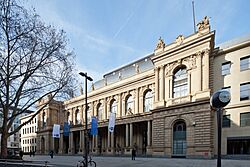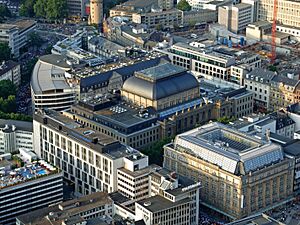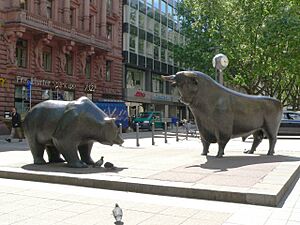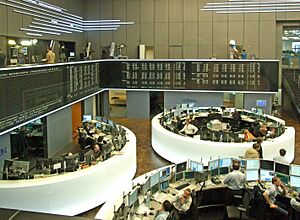Frankfurt Stock Exchange facts for kids
| Frankfurt Stock Exchange | |
|---|---|
Quick facts for kids
Frankfurter Wertpapierbörse
|
|
| Boerse Frankfurt.svg | |
| Type | Stock exchange |
| Location | [[Frankfurt, Hesse]], Germany |
| Coordinates | 50°06′55″N 8°40′40″E / 50.11528°N 8.67778°E |
| Founded | 1585 |
| Owner | Deutsche Börse, Börse Frankfurt Zertifikate AG |
| Currency | Euro |
| MarketCap | US$2.37 trillion (March 2023) |
The Frankfurt Stock Exchange (also known as German: Börse Frankfurt) is one of the oldest and largest stock exchanges in the world. It is a very important place where people buy and sell parts of companies, called shares. This exchange operates for many hours each day, from 8:00 AM to 10:00 PM German time. It is a key part of the global financial market.
Contents
What is the Frankfurt Stock Exchange?
The Frankfurt Stock Exchange is located in Frankfurt, Germany. It is owned and run by a company called Deutsche Börse AG and Börse Frankfurt Zertifikate AG. This exchange is in the central business area of Frankfurt, known as the Bankenviertel. It is the biggest of Germany's seven regional stock exchanges. Most of its business, about 90 percent, happens in Germany. This trading takes place on two main platforms: Xetra and Börse Frankfurt.
Important Stock Market Indexes
The Frankfurt Stock Exchange uses several important indexes to track how the market is doing. These include the DAX, DAXplus, CDAX, DivDAX, LDAX, MDAX, SDAX, TecDAX, VDAX, and EuroStoxx 50. The DAX is the most famous German stock index. It helps people understand the overall health of the German stock market.
How Trading Works: Xetra and Börse Frankfurt
Deutsche Börse AG runs two main ways to trade at the Frankfurt Stock Exchange. These are Xetra and Börse Frankfurt.
Xetra: The Digital Trading Platform
Xetra is the main digital platform for trading German shares and exchange-traded funds (ETFs). In 2015, about 90 percent of all share trading in Germany happened on Xetra. For companies listed on the DAX, Xetra handles 60 percent of their trading across Europe. Trading on Xetra happens from 9:00 AM to 5:30 PM on trading days. The prices set on Xetra are used to calculate the DAX index. More than 200 trading groups from 16 European countries, plus Hong Kong and the United Arab Emirates, connect to Xetra through servers in Frankfurt.
Börse Frankfurt: For Private Investors
Börse Frankfurt is another trading place, mostly used by individual investors. It offers over a million different types of securities from German and international companies. Special traders, called "specialists," work on the trading floor to help manage the buying and selling of these securities.
Keeping Trading Fair and Safe
Trading at the Frankfurt Stock Exchange follows clear rules that apply to everyone. There are independent groups that watch over the market to make sure everything is fair. These groups include the Trading Surveillance Office (HÜSt), the Exchange Supervisory Authority, and the Federal Financial Supervisory Authority (BaFin).
To help keep prices steady and prevent mistakes, Xetra and Börse Frankfurt have special safety measures. These include things like "volatility interruption," "market order interruption," and "liquidity interruption." These measures help stop trading temporarily if prices change too quickly or if there aren't enough buyers or sellers.
A Look at History
The Frankfurt Stock Exchange has a very long history, going back to trade fairs in the 11th century. By the 1500s, Frankfurt was a rich and busy city known for trade and money services.
In 1585, a special place was set up to create fixed currency exchange rates. This is seen as the official start of the stock exchange. Over the next few centuries, Frankfurt became one of the first stock exchanges in the world. It grew alongside exchanges in Amsterdam, London, and Paris. Famous bankers like Mayer Amschel Rothschild helped shape Frankfurt's financial trading.
In 1879, the Frankfurt Stock Exchange moved into its new building at Börsenplatz. By the late 1800s, Frankfurt was a major financial hub in the Atlantic world. After World War II in 1949, the Frankfurt Stock Exchange became the main stock exchange in Germany. This brought in many investments from Germany and other countries.
During the 1990s, the Frankfurt Stock Exchange was also home to the Neuer Markt (New Market). This was part of the worldwide dot-com boom, where many internet and technology companies were created. In 1993, the Frankfurter Wertpapierbörse officially became Deutsche Börse AG, which now runs the exchange.
From the 1960s, the Frankfurt Stock Exchange benefited from being close to the Bundesbank, Germany's central bank. The Bundesbank made important financial decisions for Europe until the euro currency was introduced in 2002. Since then, the exchange has benefited from the European Central Bank being located in Frankfurt.
See also
 In Spanish: Bolsa de Fráncfort para niños
In Spanish: Bolsa de Fráncfort para niños
 | Victor J. Glover |
 | Yvonne Cagle |
 | Jeanette Epps |
 | Bernard A. Harris Jr. |





